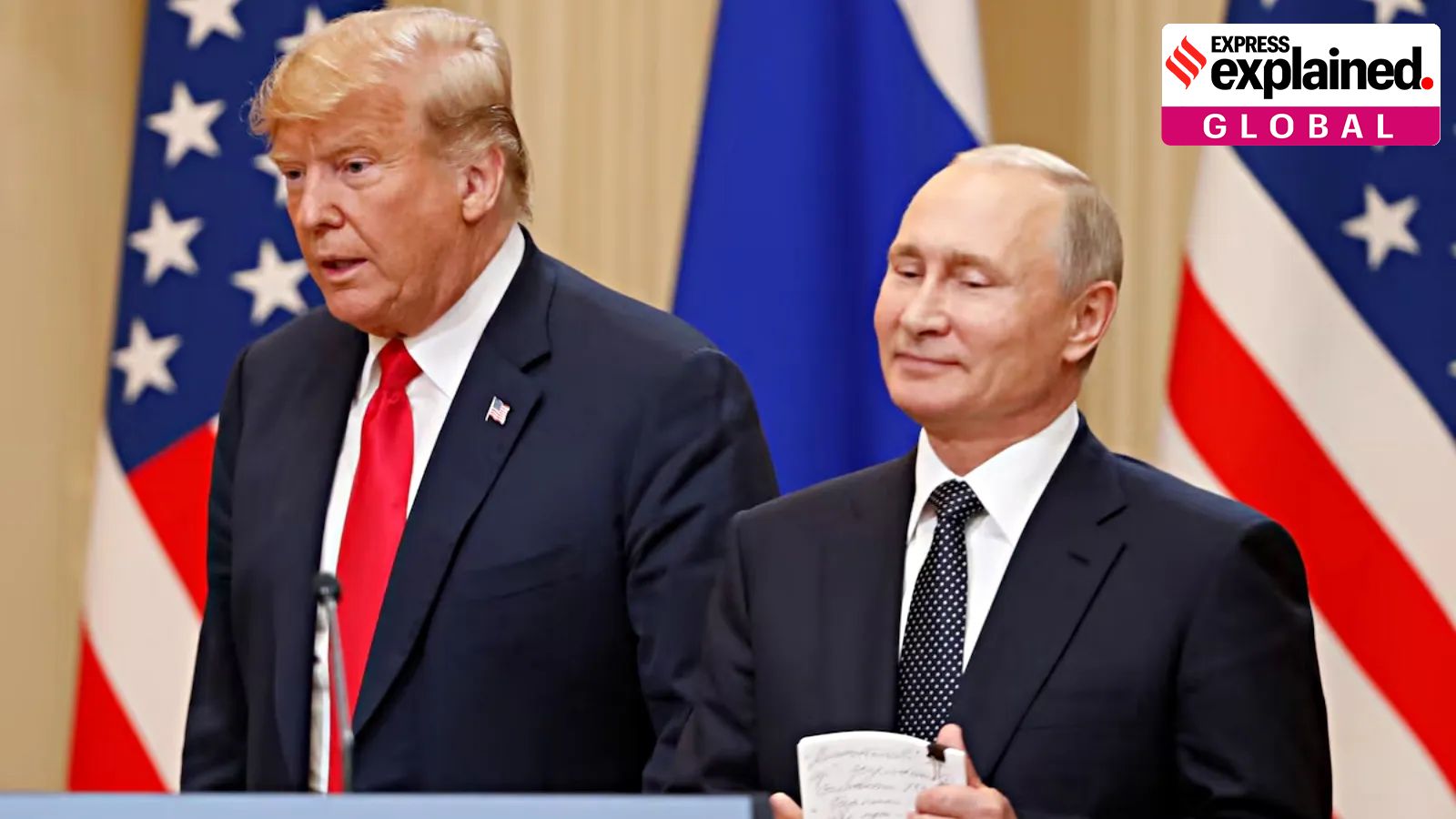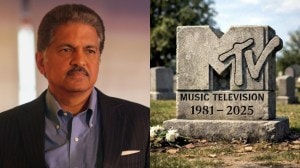Why Crimea matters to Russia
As the US pushes for an end to the war in Ukraine, Donald Trump has said the Black Sea peninsula will stay with Russia. Why is Crimea, annexed by Vladimir Putin in 2014, so important to Russia? And what implications does the formal US recognition of Crimea as part of Russia have for Ukraine?
 President Donald Trump, left, with Russian President Vladimir Putin. (File)
President Donald Trump, left, with Russian President Vladimir Putin. (File)
The Crimean peninsula had been “handed to” Vladimir Putin by Barack Obama, but now, “Crimea will stay with Russia”, United States President Donald Trump told Time Magazine in an interview published on Friday.
Earlier this week, Trump pressed Ukraine to accept a peace deal under which the US would reportedly recognise Crimea — which Russia seized in 2014 — as Russian territory.
Formally accepting Crimea as part of Russia would reverse a major American foreign policy position.
Experts have pointed out that while it may be acceptable — even reasonable under the circumstances — to concede an indefinite illegal occupation of Crimea, it is quite another thing to officially condone a change of Ukraine’s national borders by force.
The importance of Crimea
Geography is a key determinant of what makes a place strategically valuable. At very few places in the world does this statement ring truer than in Crimea, whose strategic value arises not only out of its own geography, but that of the larger Russian Federation.

QUEST FOR WARM WATER PORTS: Russia’s coastline stretches more than 37,000 km. However, much of it is to the north of the Arctic Circle, where sea ice makes many Russian ports unusable in the winter. As such, the quest for warm water ports has guided centuries of Russian foreign policy.
“The history of Russia may be written in terms of its search for ocean ports. The Russian Bear will not be content until it finds warm water…,” the geographer George Babcock Cressey wrote in his influential book, The Basis of Soviet Strength (1945).
GATEWAY TO MEDITERRANEAN: The Black Sea is by far the warmest marine feature bordering Russia. It is also the only way for Russia to directly access the Mediterranean Sea — through the vital Turkish-controlled Bosphorus and Dardanelles straits — and by extension, southern Europe, Africa, West Asia, and beyond.
More than a century ago, in 1913, Sergey Sazonov, then Foreign Minister of Russia, told Tsar Nicholas II: “The straits in the hands of a strong state means the full subjection of the economic development of South Russia to that state” (quoted by John A Morrison in ‘Russia and Warm Water’ published in US Naval Institute Proceedings in 1952). Since the late 18th century, Russia has projected power and secured its access to the Mediterranean with its Black Sea Fleet military unit.
IMPORTANCE OF SEVASTOPOL: The Black Sea ports of Sochi and Novorossiysk, in the Krasnodar Krai in southern Russia, are fairly shallow and require ships to moor offshore. This makes them less-than-ideal bases for the Black Sea Fleet, unlike its historic home: the deep water port of Sevastopol in Crimea.
Sevastopol lies at the heart of Crimea’s importance to Moscow, especially since the disintegration of the Soviet Union. In the 1990s, control over Sevastopol was central to the tensions between Russia and nascent Ukraine. Out of negotiations to manage these tensions arose the Kharkiv Pact of 1997, which gave Crimea to Ukraine but allowed Russia to keep control of Sevastopol until 2017. In 2010, the lease was extended up to 2042, before Russia pulled out of the treaty in 2014.
Context in current war
In 2014, a massive pro-Western political movement ousted then President Viktor Yanukovych of Ukraine, who was seen in his country as a Russian puppet. Yanukovych fled Ukraine on February 22 that year, and Russian forces took control of Crimean strategic sites days later.
In mid-March 2014, after Crimean authorities declared independence and asked to join Russia, the peninsula was formally incorporated as part of Ukraine’s giant neighbour. Moscow’s action was guided by two primary considerations.
FIRST, Russia wanted to secure control over Sevastopol. The renewal of the lease in 2010 was extremely unpopular among the sections of Ukrainians who had overthrown Yanukovych and taken control of the country. The Kremlin could not have allowed the new government in Kyiv the time to consolidate and consider action on Sevastopol.
SECOND, the new pro-West dispensation that took power in Kyiv following the Maidan Revolution was expected to push to join NATO, as other former Warsaw Pact members including Romania and Bulgaria, also on the Black Sea, had already done.
Ukraine joining the US-led, anti-Russia military alliance would leave Russia deeply vulnerable in the Black Sea, once regarded as a “Soviet lake”. Taking full control of Crimea was vital in the context of a possible future invasion of Ukraine, for which the peninsula would provide the required foothold and launchpad.
Putin finally invaded eight years later — in February 2022. Apart from the larger insecurity with the possible expansion of NATO to its doorstep, Crimea played a crucial role in Russia’s decision.
THE QUESTION OF WATER: Crimea is arid, with insufficient rainfall to meet the needs of its roughly 2.5 million population. So the erstwhile USSR had built the 400-km-long North Crimean Canal to carry the water of the Dnieper river from mainland Ukraine to the peninsula.
Soon after Russia annexed Crimea in February-March 2014, Ukraine dammed the canal ahead of its entry into the peninsula. According to a study from 2015, the canal was supplying up to 85% of Crimea’s water at the time it was shut down.
Two days after invading Ukraine in 2022, Russian forces blew up the dam on the canal. “In order to guarantee the supply of water in the long term, Putin wants to control the canal all the way to the Dnieper river, which means occupying the province of Kherson…,” Russia expert Peter Rutland wrote for Responsible Statecraft, the online magazine of the Washington-based Quincy Institute.
The city of Kherson, on the western bank of the Dnieper, is currently under Ukrainian control. But Russia occupies much of the territory in the oblast to the east of the river — and effectively controls the fate of the North Crimean Canal.
Donald Trump’s proposal
Crimea had been part of Russia’s empire for hundreds of years until 1954, when the Soviet leader Nikita Khruschev transferred control over the peninsula to Kyiv as a “gift”. Putin does not accept this, and Trump’s proposal backs and legitimises his position. By freezing Ukraine’s political map as it stands today, the US will secure Crimea — and the canal — for Moscow for the long term.
“We are ready to reach a deal,” Sergey Lavrov, Russia’s Foreign Minister, said in an interview aired on CBS News on Thursday.
Two days previously, President Volodymyr Zelenskyy of Ukraine had said that no deal that would have Ukraine ceding any of its territory was acceptable. “There’s nothing to talk about here. This is against our constitution,” he said on Tuesday.
Commentators have noted that it would be geopolitical suicide for Ukraine to accept Trump’s proposal — for once Putin and his army have won a breather, Russia is certain to move to conquer all of Ukraine. Others have circled back to the concern that making such a concession to Russia would set a precedent for China to walk into Taiwan.
Back in 2022, then Senator Marco Rubio of Florida had co-sponsored a legislative measure that barred the US from recognising any Russian claims on Ukrainian land because that would “risk establishing a dangerous precedent for other authoritarian regimes, like the Chinese Communist Party, to imitate”.
Rubio, now the US Secretary of State, is keen to support President Trump’s efforts to end the war, no matter the cost to Ukraine.
- 01
- 02
- 03
- 04
- 05






































